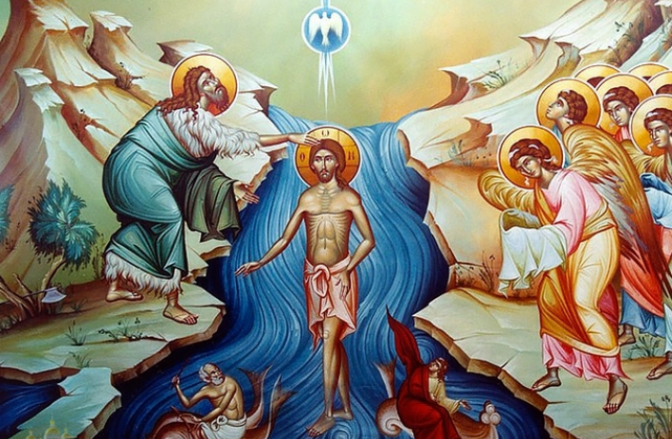
Photo: media-resource of Ukrainian Greek-Catholic Church
Today, Ukrainians celebrate the feast of Baptism of the Lordф, or Epiphany. It completes the holidays of the Christmas and New Year cycle and is also one of the greatest Christian holidays.
Read also: Epiphany: Ukrainians celebrate the second Holy Supper, or «hungry kutia»
The holiday is one of the «Twelve» in the Orthodox and Greek Catholic Churches (twelve most important holidays after Easter, dedicated to the events of the earthly life of Jesus Christ and the Virgin Mary). On this day, people around the world commemorate an important event in the life of Jesus Christ – his baptism in the Jordan River.
The celebration of the Baptism of the Lord began on the evening of 18 January. At this time, services were held in the temples, and the water of the faithful was consecrated. Traditionally on Epiphany, a dish «hungry kutia» is prepared, and the family gathers at a festive table with the appearance of the first star in the sky.
Read also: Lviv moves the citywide consecration of Epiphany water to 19 January
It should be noted that the traditional city-wide consecration of water on Epiphany was cancelled in Lviv. This is due to the increasing incidence of Covid-19. To avoid crowds, the fathers held a consecration ceremony on the morning of 19 January. Anyone can come to the Market Square during the day and collect holy water from the tank.
Tvoe Misto media-hub broadcasted the rite of consecration on its Ukrainian-language resources: website, Facebook page and YouTube channel.
For reference: The majority faith in Lviv is Greek Catholicism, a Christian confession which acknowledges Catholic doctrine and is in communion with the Pope, but maintains Eastern rites and rituals, including married priests and the old-style Julian calendar, 13 days behind most Western religious holidays. Outside of the western region of Galicia, most Ukrainians are Orthodox Christians, also abiding by the Julian calendar, but affiliated with Constantiple rather than in communion with Rome.
The Ukrainian Greek Catholic Church emerged in 1596, when a part of the Orthodox Church recognised the supremacy of the Pope. Later, the Ukrainian Greek Catholic Church (UGCC) became mostly localised in the Western Ukraine, becoming one of the markers of the national identity for the region’s population during Austrian, Polish and Soviet rule.
Currently, Kyiv is the center of Ukrainian Greek Catholic Church, under the jurisdiction of His Beatitude Sviatoslav Shevchuk, major archbishop of Kyiv-Galicia, and it is present in many regions of the country, though Galicia, where Lviv is, still remains its bulwark. It also has a strong presence among the Ukrainian diaspora, especially in parts of Canada, the United States, and Australia.
Translated by Vitalii Holich
You can read a Ukrainian language version of this story here.
Follow Lviv Now on Facebook and Instagram. To receive our weekly email digest of stories, please follow us on Substack.
Lviv Now is an English-language website for Lviv, Ukraine’s «tech-friendly cultural hub.» It is produced by Tvoe Misto («Your City») media-hub, which also hosts regular problem-solving public forums to benefit the city and its people.












